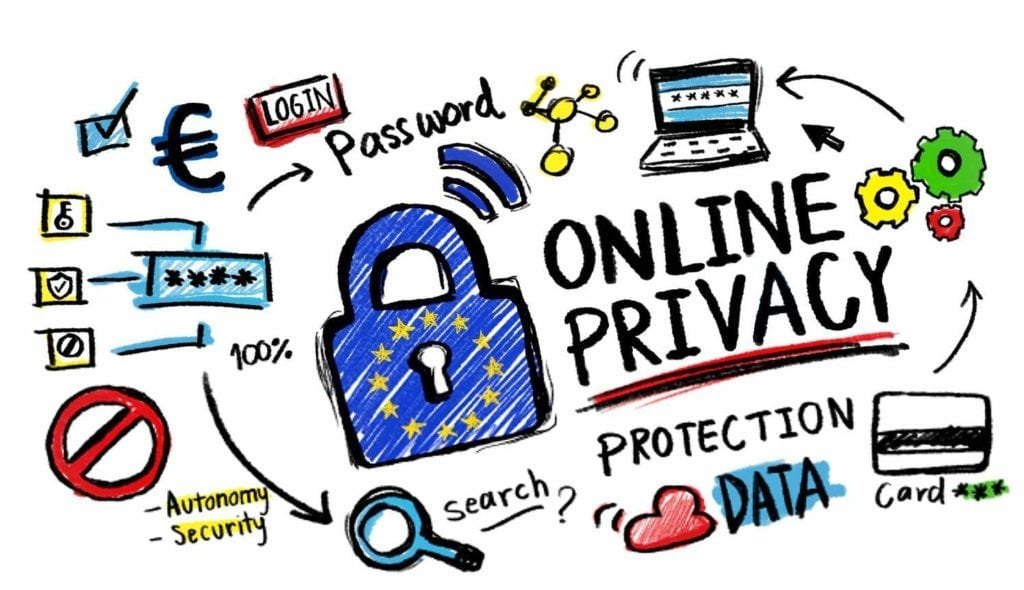Written by Govinda Dahal, webmaster & SEO – VIN
In today’s hyperconnected world, digital privacy is no longer a luxury—it’s a necessity. From social media tracking your clicks to websites harvesting your data, the online landscape is filled with silent threats. As we enter 2025, the need to protect digital privacy is greater than ever.

This guide will walk you through practical strategies, online privacy best practices, and the top privacy tools in 2025. Whether you’re a casual internet user or a digital native, protecting your data starts with awareness and action.
Why Digital Privacy Matters More in 2025
Every time you open an app, visit a website, or connect to public Wi-Fi, you leave behind a digital footprint. That data can be tracked, bought, or stolen. Identity theft, cyberstalking, phishing scams, and unwanted surveillance are growing threats.
But the good news? You can take control of your privacy. It starts with small steps and smart tools.
How to Protect Your Digital Privacy in 2025

You don’t need to be a cybersecurity expert. You just need to build habits that minimize your exposure online. Let’s explore the key digital privacy tips 2025 has to offer.
1. Practice Secure Browsing Habits
Your web browser is a window to the internet—and a doorway to your data.
What You Can Do:
- Use privacy-focused browsers like Brave, Firefox, or DuckDuckGo Browser
- Always use HTTPS websites
- Enable “Do Not Track” requests (in browser settings)
- Disable third-party cookies
These simple changes help prevent tracking and reduce your data exposure.
2. Use Strong, Unique Passwords (and a Password Manager)
Passwords are your first defense. Weak or reused passwords are like open doors to your digital life.
Privacy Tips for 2025:
- Use a password manager like 1Password, Bitwarden, or Dashlane
- Enable 2FA (Two-Factor Authentication) wherever possible
- Avoid using personal info (birthdays, names, pet names)
A password manager doesn’t just store your credentials—it also creates strong, unique passwords that are difficult to crack.
3. Know Your App Permissions
Apps often ask for more access than they need. Some even run in the background collecting data.
What to Review:
- Location tracking: Is it really necessary for a game or calculator app?
- Microphone & camera access: Revoke it unless the app truly needs it
- Contacts and file storage access: Only allow trusted apps
Checking app permissions monthly can prevent unwanted digital privacy leaks.
Online Privacy Best Practices for 2025
Staying safe online isn’t about being paranoid—it’s about being proactive. Here are smart habits you can adopt today.
1. Avoid Public Wi-Fi or Use a VPN
Public Wi-Fi is a hacker’s paradise. Without encryption, your data is up for grabs.
Best Practice:
Use a VPN (Virtual Private Network) like NordVPN, ExpressVPN, or ProtonVPN. These tools encrypt your internet traffic, making it unreadable to snoopers—even on public networks.
2. Beware of Phishing Emails and Links
Cybercriminals are getting smarter. A single click on a malicious link can compromise your entire system.
Digital Security Advice:
- Always verify the sender
- Don’t click on suspicious links or download unknown attachments
- Hover over links to preview their destination
When in doubt, don’t click.
3. Log Out of Accounts When Not in Use
Staying logged in across devices opens up vulnerability points. If a device is stolen or hacked, your accounts are at risk.
Make it a habit to log out of email, social media, and online banking when you’re done using them.
Top Privacy Tools in 2025: Protect Your Data with Smart Tech
Let’s explore the digital privacy protection tools that can give you peace of mind in 2025.
1. VPN for Privacy
As mentioned, VPNs are essential. They:
- Mask your IP address
- Encrypt your traffic
- Allow anonymous browsing
Look for a VPN with a no-logs policy and strong encryption protocols.
2. Encrypted Messaging Apps
Your conversations should be private. Use apps that offer end-to-end encryption:
- Signal
- Telegram (secret chat only)
- Threema
Avoid standard SMS or unencrypted platforms for sensitive chats.
3. Anti-Tracking Software
Trackers follow you across websites. Block them with tools like:
- Privacy Badger
- uBlock Origin
- Ghostery
These browser extensions block scripts that monitor your behavior.
What Are the Best Tips for Online Privacy in 2025?
Let’s recap some essential online privacy tips:
- Use multi-layered security (VPN + antivirus + 2FA)
- Don’t overshare on social media
- Keep software up to date
- Avoid using the same password across platforms
- Regularly audit your privacy settings on Google, Facebook, etc.
Privacy isn’t a one-time setup. It’s an ongoing practice.
How Do I Protect My Online Privacy in 2025?
You asked. Here’s a step-by-step action plan:
- Secure your devices: Set up screen locks, biometric ID, or PINs
- Update everything: Old software is vulnerable software
- Minimize digital footprint: Delete unused accounts, unsubscribe from email lists
- Use private search engines: Try DuckDuckGo or Startpage
- Think before you click: Avoid suspicious links and pop-ups
Even small changes have a big impact.
Final Thoughts: Take Back Control of Your Digital Life
Online freedom begins with privacy. Whether you’re browsing, shopping, chatting, or streaming, you deserve to feel secure. With the right mix of privacy tips for consumers 2025, common sense, and trusted digital privacy protection tools, you can reduce your exposure to digital threats.
Remember, privacy is power. Own it.
Want to help others protect their digital lives?
Volunteer with us at Volunteers Initiative Nepal and share your knowledge of digital safety, privacy tools, and responsible tech use with underserved communities across Nepal. Make a meaningful impact today.


